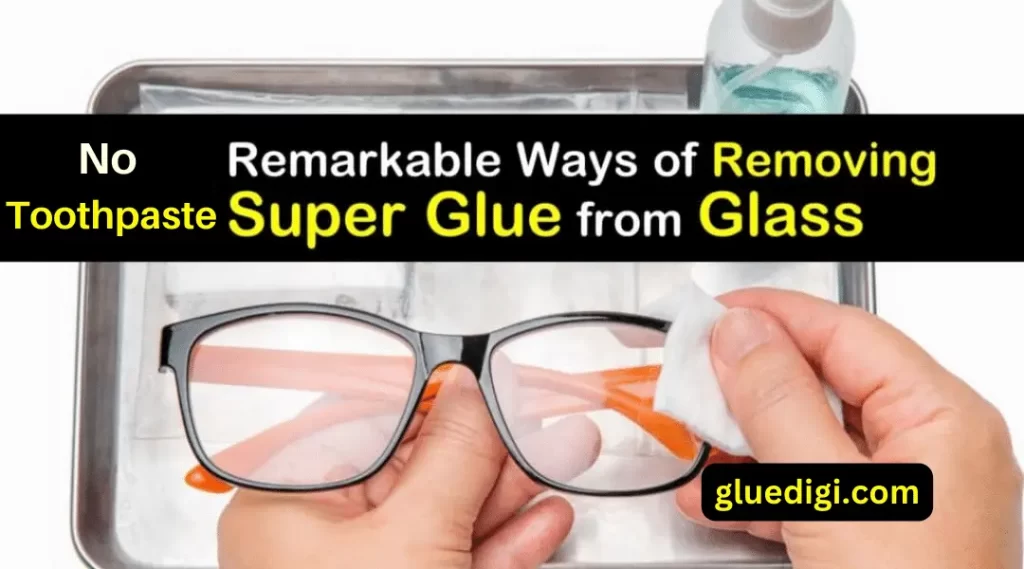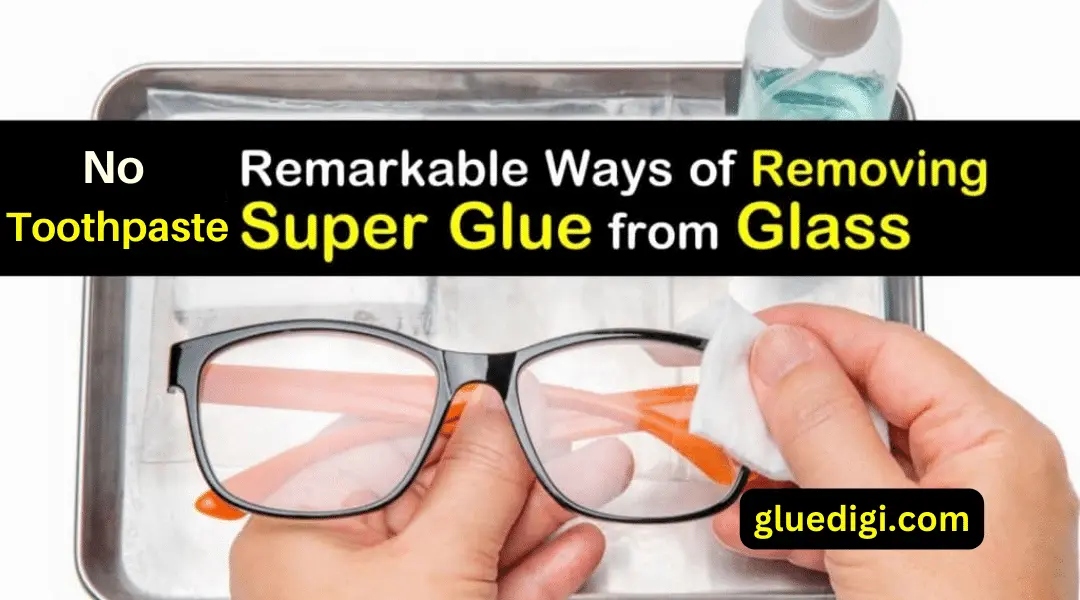As someone who wears glasses regularly, I know how frustrating it can be to accidentally get super glue on them. The glue can dry up and become almost impossible to remove, leaving your glasses looking unsightly and affecting your vision. Fortunately, there’s a simple and effective solution – toothpaste!
To remove super glue from glasses with toothpaste, apply toothpaste on the affected area, gently rub in circular motions, then wipe away with a clean, damp cloth.
In this article, I’ll guide you through the step-by-step process of removing super glue from glasses with toothpaste. I’ll also cover important information about the effects of super glue on glasses, tips for effective glue removal, and answers to frequently asked questions.
Why Removing Super Glue from Glass is Important
Before we dive into the process of removing super glue from glasses, let’s briefly discuss why this is important. When super glue comes into contact with your glasses, it can leave unsightly marks that can obscure your vision. Additionally, the glue can cause permanent damage to your glasses if not removed promptly. Toothpaste is a simple and effective solution for removing super glue without damaging your glasses.
How Super Glue Affects Glasses
Super glue can have several adverse effects on glasses due to its strong adhesive properties. Here are some ways super glue can impact your glasses:
1. Residue Buildup
- Super glue can leave behind residue on the surface of the glasses.
- This residue can be stubborn and difficult to remove, leading to a hazy or cloudy appearance.
2. Impaired Clarity
- When super glue residue accumulates on glasses, it can obstruct your vision.
- The residue may cause blurriness or distort the clarity of your lenses.
3. Surface Damage
- Super glue can potentially damage the surface of your glasses, especially if you try to forcefully remove it.
- Scratches, scrapes, or discoloration may occur, affecting the overall look and functionality of your glasses.
4. Delicate Component Risk
- Glasses often have delicate components, such as frames, nose pads, or hinges.
- Super glue can inadvertently bond these components together or cause them to become stuck, leading to potential damage or breakage.
5. Lens Discoloration
- Some super glue formulas can cause discoloration or a yellowing effect on the lenses.
- This discoloration can compromise the visual clarity and aesthetics of your glasses.
It’s important to handle super glue with care and take prompt action to remove any residue from your glasses to maintain their optimal condition.
Before You Begin
Before diving into the process of removing super glue from your glasses, it’s important to make some preparations. Here’s what you need to do:
1. Gather the Necessary Materials
- Toothpaste: Opt for a non-gel, non-whitening toothpaste.
- Soft, Lint-free Cloth or Cotton Swabs: These will be used for gentle rubbing.
- Mild Soap and Water: You’ll need these for the final cleaning.
2. Choose the Right Toothpaste
- Ensure the toothpaste you select doesn’t contain abrasive particles, as they may scratch the glasses.
- Non-gel and non-whitening toothpaste works best for this purpose.
3. Inspect the Glasses
- Before proceeding, examine your glasses for any loose parts or damage.
- If there are fragile components, exercise extra caution during the cleaning process.
By making these preparations, you’ll be ready to tackle the task of removing super glue from your glasses using toothpaste.
How to Remove Super Glue from Glasses with Toothpaste

1. Assessing the Glue Residue
- Examine your glasses to determine the extent of the super glue residue.
- Check for any damage that may require professional assistance.
2. Applying Toothpaste
- Squeeze a small amount of toothpaste onto your fingertip.
- Gently spread the toothpaste evenly on the affected area of the glasses.
- Avoid applying excessive pressure or using abrasive motions that could harm the lenses.
3. Gentle Rubbing
- Take a soft, lint-free cloth or a cotton swab.
- Using gentle circular motions, rub the toothpaste onto the super glue residue.
- Pay extra attention to delicate parts of the glasses, such as the frames or any intricate designs.
4. Waiting and Drying
- Allow the toothpaste to sit on the glue residue for approximately 5-10 minutes.
- During this waiting period, avoid touching or manipulating the glasses.
- Ensure the toothpaste is completely dry before proceeding to the next step.
5. Removing Toothpaste Residue
- Take a clean, damp cloth and gently wipe away the dried toothpaste from the glasses.
- Be thorough in removing any residual toothpaste to avoid streaks or smudges.
6. Final Cleaning and Inspection
- Clean the glasses with mild soap and water to remove any remaining residue.
- Rinse them carefully, ensuring no soap residue is left behind.
- Inspect your glasses for any lingering super glue residue or damage.
- If necessary, repeat the entire process to achieve optimal results.
Remember to be patient and gentle throughout the process. With toothpaste as your ally, you can effectively remove super glue from your glasses and restore their clarity.
Alternatives to Toothpaste
If you don’t have toothpaste on hand, there are some alternative methods you can try for removing super glue from glasses.
If you don’t have toothpaste on hand or prefer to explore other options, here are some effective alternatives for removing super glue from glass:
1. Acetone or Nail Polish Remover
- Acetone, commonly found in nail polish remover, is a potent solvent that can dissolve super glue.
- Dampen a cotton ball or cloth with acetone and gently rub the glue residue.
- Exercise caution when using acetone, as it may damage certain types of glass. Test it on a small, inconspicuous area first.
2. Isopropyl Alcohol
- Isopropyl alcohol, also known as rubbing alcohol, can be effective in breaking down super glue.
- Dampen a cloth or cotton ball with isopropyl alcohol and gently rub the affected area.
- Like acetone, test it on a small area of the glass first to ensure it doesn’t cause any damage.
3. Warm Soapy Water
- Create a solution of warm water and mild dish soap.
- Soak a cloth or sponge in the soapy water and gently scrub the glue residue.
- Rinse the glass thoroughly with clean water and dry it with a lint-free cloth.
4. Vinegar
- White vinegar can help dissolve super glue on glass surfaces.
- Soak a cloth or sponge in white vinegar and dab it onto the glue residue.
- Let it sit for a few minutes, then gently rub the area to remove the softened glue.
- Rinse the glass with water and dry it thoroughly.
5. Baking Soda Paste
- Mix baking soda with a small amount of water to create a thick paste.
- Apply the paste to the super glue residue and let it sit for a few minutes.
- Gently scrub the area with a soft cloth or sponge, then rinse the glass and dry it completely.
Remember to exercise caution and test these alternatives on a small area of the glass before proceeding with the entire surface. Different types of glass may react differently to these substances.
Tips for Effective Glue Removal
To ensure you effectively remove all the super glue from your glasses without damaging them, here are some important tips to keep in mind:
- Avoid using hot water or steam to remove the glue, as this can damage your glasses.
- Use a small amount of toothpaste to avoid excessive scrubbing or pressure on your glasses.
- Be gentle when scrubbing your glasses to avoid scratching the surface.
- Use a microfiber cloth to wipe off the toothpaste and glue residue, as other materials can scratch the surface of your glasses.
Cleaning Glasses After Glue Removal
After successfully removing super glue from your glasses, it’s important to properly clean them to avoid any further damage. Here’s how you can clean your glasses:
- Rinse your glasses with warm water to remove any remaining toothpaste.
- Apply a small amount of lens cleaner to a microfiber cloth.
- Use the cloth to gently clean the surface of your glasses.
- Dry your glasses with a clean, dry microfiber cloth.
Using Alternative Methods to Clean Glasses
If you don’t have lens cleaner on hand, you can also use a mixture of water and mild dish soap to clean your glasses. Just make sure to rinse them thoroughly and dry them with a clean cloth
Affecting Glue Removal
There are several factors that can affect the success of removing super glue from glasses with toothpaste. These include:
- The type and quality of toothpaste used: Toothpaste with higher abrasion can be more effective at removing super glue, but it’s important to ensure that it’s not too abrasive to avoid scratching your glasses.
- The extent of the glue residue: The more glue residue there is on your glasses, the longer it may take to remove it. Be patient and repeat the process until all the glue has been removed.
- The type of glasses: Different types of glasses may require different approaches for removing super glue. For instance, acetone or nail polish remover can damage plastic lenses, so toothpaste may be a better option for removing super glue from plastic glasses.
Conclusion
Removing super glue from glasses with toothpaste can be a frustrating experience, but with the right tools and techniques, it’s a problem that can be solved quickly and easily. Toothpaste is a simple and effective solution that can remove super glue without damaging your glasses. Remember to be patient, gentle, and persistent in your approach to effectively remove super glue from your glasses with the help of toothpaste.
